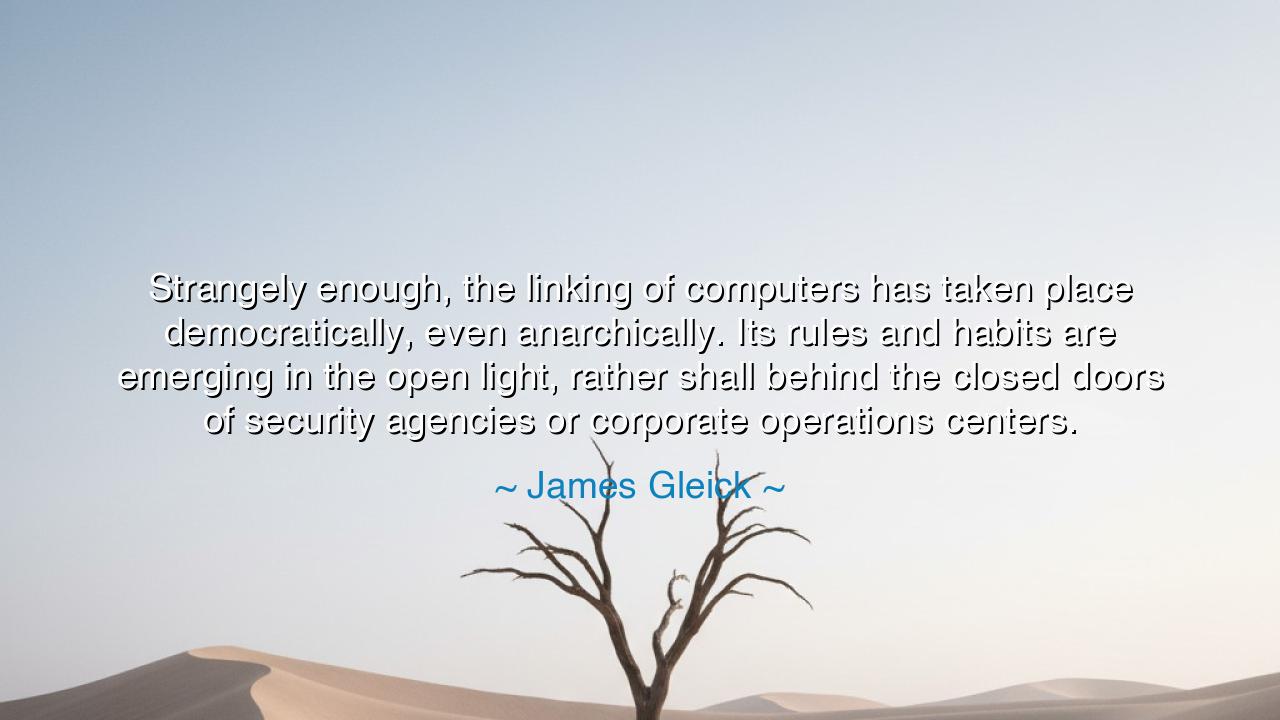
Strangely enough, the linking of computers has taken place
Strangely enough, the linking of computers has taken place democratically, even anarchically. Its rules and habits are emerging in the open light, rather shall behind the closed doors of security agencies or corporate operations centers.






In a time when the world was awakening to a new kind of power — the invisible web of information — James Gleick looked upon the rise of the computer network and spoke as a chronicler of civilization’s next great revolution: “Strangely enough, the linking of computers has taken place democratically, even anarchically. Its rules and habits are emerging in the open light, rather than behind the closed doors of security agencies or corporate operations centers.” These words carry both wonder and reverence, for they describe the birth of a phenomenon unlike any empire or institution before it — a network born not from kings or councils, but from the people themselves.
In the ancient world, knowledge was guarded like treasure. The scrolls of Alexandria, the codes of the scribes, the secrets of the alchemists — all were held by the few to rule the many. Power flowed downward from the throne, and access was the privilege of lineage and wealth. But the digital age, as Gleick observed, broke this ancient pattern. The linking of computers — the birth of the Internet — did not begin in marble halls or secret chambers, but in the open fields of curiosity. It grew from collaboration, not command; from chaos, not control. Like the Agora of ancient Athens, it was a place where anyone could speak, anyone could build, and the strength of the system lay not in its hierarchy, but in its openness.
Consider the story of Tim Berners-Lee, the humble physicist who, working at CERN, envisioned the World Wide Web. He did not patent his creation or guard it behind a wall of profit. Instead, he gifted it freely to humanity — an act that transformed the world more profoundly than the might of armies. This decision, like the democratic spirit Gleick describes, unleashed a revolution that continues to shape every heart and home. From the whispers of code written by lone dreamers to the vast infrastructures of modern communication, the web grew wild and free — an anarchic harmony, much like life itself.
Yet this freedom was not born without tension. As the ancients warned, all liberty invites danger. Where there is openness, there is also disorder; where there is access, there is temptation. The Internet became both oracle and labyrinth — a space where truth and falsehood, beauty and corruption, coexisted side by side. But still, its light of openness endured, for its very chaos was its genius. No tyrant, no monopoly, could fully master it. Even the most powerful governments found themselves humbled before the sheer anarchy of information, which moved like wind through any wall.
The meaning of Gleick’s insight is profound: he saw that for the first time in human history, a vast system — the linking of minds across machines — was evolving without a single master. Its rules were shaped not by decree, but by participation. It was democracy encoded into the circuitry of civilization. In this, he recognized a new kind of power — not the power to dominate, but the power to connect, to create, and to share. It was as if humanity had, after millennia of central rule, rediscovered its collective voice through wires and screens.
And yet, his words also carry a warning to the future: that this open light must be preserved. For as surely as freedom invites control, the forces of secrecy and profit ever seek to reclaim what the people have built. The Internet’s greatest danger lies not in its chaos, but in its capture — when it ceases to belong to the many and becomes the tool of the few. The spirit of anarchy that birthed it must not be feared, but cherished, for it is the spark that keeps the web alive with possibility.
The lesson, then, is clear: what is created in openness must be defended in openness. As the ancients tended their sacred fires, so must we tend the flame of free connection. Let no one surrender it to the cold halls of power. Let knowledge flow as the rivers once flowed — unowned, unbound, and ever-renewing. For in this great linking of minds, this vast and living network, we see a reflection of humanity’s oldest dream: that wisdom, shared among all, may lift the whole world.
Thus, remember the teaching of James Gleick: that the mightiest creations of man are not those born of control, but of collaboration and courage. The linking of computers — and of human souls through them — stands as proof that order may spring from freedom, and that in the open light of truth, even chaos can give birth to harmony.






AAdministratorAdministrator
Welcome, honored guests. Please leave a comment, we will respond soon